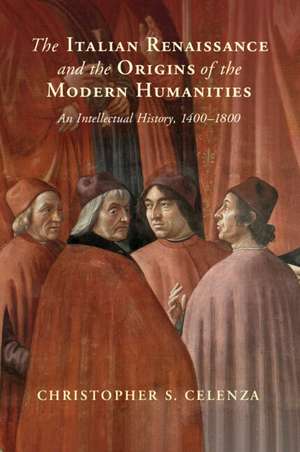The Italian Renaissance and the Origins of the Modern Humanities: An Intellectual History, 1400–1800
Autor Christopher S. Celenzaen Limba Engleză Paperback – 26 apr 2023
| Toate formatele și edițiile | Preț | Express |
|---|---|---|
| Paperback (1) | 178.53 lei 3-5 săpt. | +19.18 lei 7-11 zile |
| Cambridge University Press – 26 apr 2023 | 178.53 lei 3-5 săpt. | +19.18 lei 7-11 zile |
| Hardback (1) | 297.79 lei 3-5 săpt. | +27.93 lei 7-11 zile |
| Cambridge University Press – 8 sep 2021 | 297.79 lei 3-5 săpt. | +27.93 lei 7-11 zile |
Preț: 178.53 lei
Nou
Puncte Express: 268
Preț estimativ în valută:
34.16€ • 35.67$ • 28.21£
34.16€ • 35.67$ • 28.21£
Carte disponibilă
Livrare economică 25 martie-08 aprilie
Livrare express 11-15 martie pentru 29.17 lei
Preluare comenzi: 021 569.72.76
Specificații
ISBN-13: 9781108970419
ISBN-10: 1108970419
Pagini: 339
Dimensiuni: 228 x 151 x 24 mm
Greutate: 0.5 kg
Editura: Cambridge University Press
Colecția Cambridge University Press
Locul publicării:New York, United States
ISBN-10: 1108970419
Pagini: 339
Dimensiuni: 228 x 151 x 24 mm
Greutate: 0.5 kg
Editura: Cambridge University Press
Colecția Cambridge University Press
Locul publicării:New York, United States
Cuprins
1. Philology, the Italian renaissance, and authorship; 2. Lorenzo Valla, philology, emotion; 3. Losing your identity: Angelo Decembrio; 4. Trust and authenticity; 5. Pursuing a love of knowledge; 6. Shaping knowledge; 7. Forgetting philology: Rene Descartes; 8. Certainty. Skepticism; 9. Echoes.
Recenzii
'An engrossing story about how modernity was born when it learned to read and write the word. The parallels between the Italian Renaissance and our contemporary present are stunning. As before, so now: information glut and a rapidly evolving mediascape are challenges that only a new investment in critical sense-making – 'philology,' broadly understood – can meet. Celenza's call for a reinvigorated culture of the humanities today is both historically rich and prescient. His book is sure to bring a new dimension to the debates about the uses and reach of culture today.' James I. Porter, University of California, Berkeley
'A powerful history, cutting through the artificial line too-often drawn between Renaissance and Enlightenment to present one continuity, the quiet revolution underlying all the others: the slow, painstaking advance of the conviction that knowledge-seeking can and should be unending, unlimited, and open to everyone.' Ada Palmer, University of Chicago
'Christopher Celenza brilliantly threads the needle to produce a portrait of Italian Renaissance humanism for our time. Deeply attentive to personal experiences and personal ties, he injects agency and emotion into the celebrated practice of classical and biblical philology, astutely examining figures who include Valla, Poliziano, Decembrio, and even Descartes. Celenza's enduring claim is that philology was and remains inextricably connected with philosophy.' Kristine Haugen, California Institute of Technology
'A powerful history, cutting through the artificial line too-often drawn between Renaissance and Enlightenment to present one continuity, the quiet revolution underlying all the others: the slow, painstaking advance of the conviction that knowledge-seeking can and should be unending, unlimited, and open to everyone.' Ada Palmer, University of Chicago
'Christopher Celenza brilliantly threads the needle to produce a portrait of Italian Renaissance humanism for our time. Deeply attentive to personal experiences and personal ties, he injects agency and emotion into the celebrated practice of classical and biblical philology, astutely examining figures who include Valla, Poliziano, Decembrio, and even Descartes. Celenza's enduring claim is that philology was and remains inextricably connected with philosophy.' Kristine Haugen, California Institute of Technology
Notă biografică
Descriere
Connecting to issues in the humanities today, this book shows how the Italian Renaissance influenced and changed Early Modern Europe.
